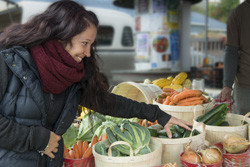Developing sustainable food practices
The project FOODLINKS(opens in new window) addressed food sustainable and consumption issues by fostering collaboration among policymakers, researchers and civil society organisations. This was accomplished through three communities of practice (CoPs), which used knowledge-brokering activities to learn how to work together. The lessons learned are summarised in recommendations for effective knowledge brokerage across science, policy-making and civil society, that are presented in a separate booklet which is available at the website(opens in new window). Besides, the project produced a policy brief that informs policymaker about the project and its results. Each CoP focused on a topic relevant to food sustainability. One addressed short food supply chains (SFCs), another looked at revaluing public food procurement, and the third studied urban food strategies. Collaboration included both face-to-face and online communication. Findings from each CoP resulted in recommendations for next steps. The CoP for SFCs determined that they are a viable alternative to long, globalised food chains and are becoming increasingly important. SFCs are more environmentally friendly and have the potential to lead to healthier diets because seasonal foods can be supplied more readily. They also may increase the viability of small- and medium-size farms and processing companies. Best practices related to public procurement demonstrated that it is one of the powerful tools available to build sustainable food systems. While an initial financial investment is needed, the benefits could include food raised according to environmentally sound methods, availability of more fairly traded products and greater support for local businesses. Finally, developing an urban food strategy means putting food on the urban agenda and forging networks among stakeholders. All three CoPs produced publicly available action plans with useful recommendations. They are available at the FOODLINKS website and are already used by policymakers and civic organisations. The findings point to the importance of four components. First, spatial proximity has the potential to improve the local economy. Second, changing food provisioning systems may promote health and social equity. Third, governments at the city-regional level may take on new responsibilities in promoting sound food policies. Finally, there is no one way to achieve these goals, but linking research, policy, advocacy and business is essential. Moving forward, to help bring about these policy changes, collaboration needs to be institutionalised, preferably at the city-regional level. The FOODLINKS website and the foodnet blog(opens in new window) can serve as a hub for further discussion and policymaking.







